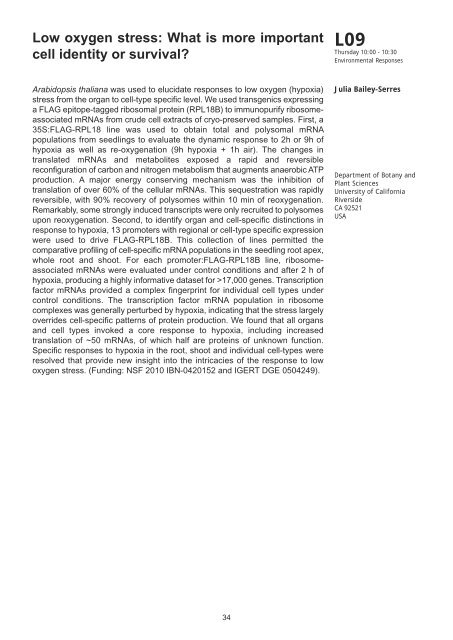Edinburgh, Scotland, United Kingdom - TAIR
Edinburgh, Scotland, United Kingdom - TAIR
Edinburgh, Scotland, United Kingdom - TAIR
You also want an ePaper? Increase the reach of your titles
YUMPU automatically turns print PDFs into web optimized ePapers that Google loves.
Low oxygen stress: What is more important<br />
cell identity or survival?<br />
Arabidopsis thaliana was used to elucidate responses to low oxygen (hypoxia)<br />
stress from the organ to cell-type specific level. We used transgenics expressing<br />
a FLAG epitope-tagged ribosomal protein (RPL18B) to immunopurify ribosomeassociated<br />
mRNAs from crude cell extracts of cryo-preserved samples. First, a<br />
35S:FLAG-RPL18 line was used to obtain total and polysomal mRNA<br />
populations from seedlings to evaluate the dynamic response to 2h or 9h of<br />
hypoxia as well as re-oxygenation (9h hypoxia + 1h air). The changes in<br />
translated mRNAs and metabolites exposed a rapid and reversible<br />
reconfiguration of carbon and nitrogen metabolism that augments anaerobic ATP<br />
production. A major energy conserving mechanism was the inhibition of<br />
translation of over 60% of the cellular mRNAs. This sequestration was rapidly<br />
reversible, with 90% recovery of polysomes within 10 min of reoxygenation.<br />
Remarkably, some strongly induced transcripts were only recruited to polysomes<br />
upon reoxygenation. Second, to identify organ and cell-specific distinctions in<br />
response to hypoxia, 13 promoters with regional or cell-type specific expression<br />
were used to drive FLAG-RPL18B. This collection of lines permitted the<br />
comparative profiling of cell-specific mRNA populations in the seedling root apex,<br />
whole root and shoot. For each promoter:FLAG-RPL18B line, ribosomeassociated<br />
mRNAs were evaluated under control conditions and after 2 h of<br />
hypoxia, producing a highly informative dataset for >17,000 genes. Transcription<br />
factor mRNAs provided a complex fingerprint for individual cell types under<br />
control conditions. The transcription factor mRNA population in ribosome<br />
complexes was generally perturbed by hypoxia, indicating that the stress largely<br />
overrides cell-specific patterns of protein production. We found that all organs<br />
and cell types invoked a core response to hypoxia, including increased<br />
translation of ~50 mRNAs, of which half are proteins of unknown function.<br />
Specific responses to hypoxia in the root, shoot and individual cell-types were<br />
resolved that provide new insight into the intricacies of the response to low<br />
oxygen stress. (Funding: NSF 2010 IBN-0420152 and IGERT DGE 0504249).<br />
34<br />
L09<br />
Thursday 10:00 - 10:30<br />
Environmental Responses<br />
Julia Bailey-Serres<br />
Department of Botany and<br />
Plant Sciences<br />
University of California<br />
Riverside<br />
CA 92521<br />
USA




